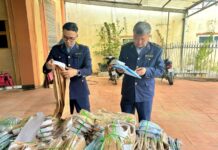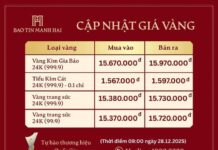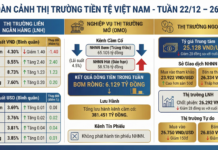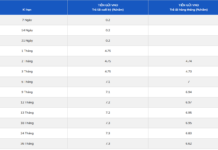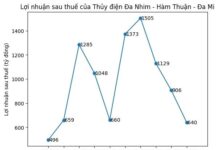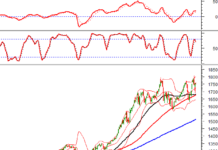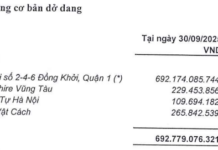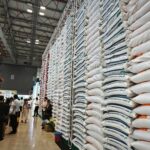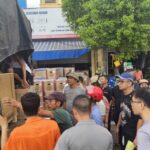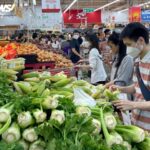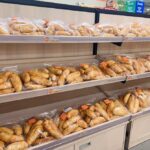At a recent meeting with the Ministry of Industry and Trade, several key gasoline and oil traders proposed reducing the total volume allocated for the entire year of 2024. This is due to the fact that there will be no sudden surge in demand from the population. Meanwhile, many businesses have suffered losses due to storms, and some have incurred losses due to the sharp decline in domestic and foreign gasoline and oil prices, while still having to maintain a 20-day reserve, making it difficult to balance.
Loss leads to request for reduced imports
In an interview with Nguoi Lao Dong newspaper, Mr. Bui Ngoc Bao, Chairman of the Vietnam Gasoline and Oil Association, shared the reality that recently, many gasoline and oil companies have been importing at high prices but have had to sell at low prices due to the sharp drop in domestic gasoline and oil prices, with a short adjustment cycle (once every 7 days). Businesses want to reduce the total volume, at least in part, due to the large inventory economics, and if they cannot sell, they must reduce inventory. “For example, in 2024, the minimum total volume of gasoline and oil allocated to the key traders is about 28.4 million cubic meters/tons, but the actual demand is only 25 million cubic meters/tons. If the companies import and cannot sell, they will have large inventories,” said Mr. Bao. Therefore, the key traders requested to reduce imports as consumption is not high.
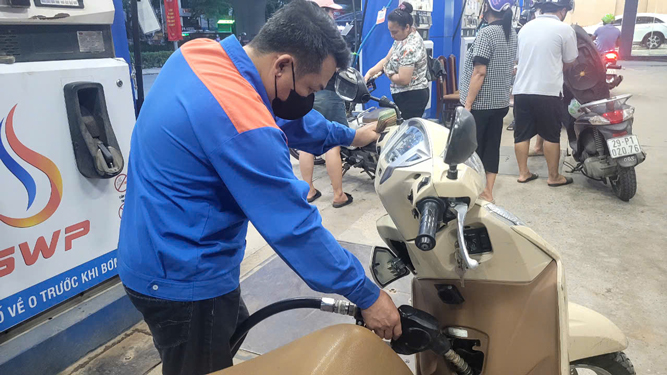
The Ministry of Industry and Trade affirmed that, barring any unexpected events, the gasoline and oil supply in 2024 will meet domestic needs. Photo: LE THUY
A key gasoline and oil company also complained that with the sharp drop in prices as in the past, each liter sold resulted in a loss of VND1,000 for the company. Supply currently exceeds demand.
According to some companies, due to the continuous decline in world prices, it takes at least 20-30 days for the key traders to import by ship, while domestic prices are adjusted once every 7 days, leading to losses for many key traders.
It’s not just the key traders who are complaining, but also the retail gasoline and oil companies, who are constantly struggling and blaming the key traders. Mr. Nguyen Xuan Thang, Director of Hai Au Phat Company Limited (Lam Dong), said that recently, retail gasoline and oil businesses have not been as efficient as before and have been incurring losses, leading to a series of gas stations having to close or transfer to key traders and distributors. The main reason is that the discount is too low, only VND 200-300 per liter, and sometimes even zero, so it cannot hold out for long.
Next is the regulation on retail invoices for each transaction, which has also caused fatigue for businesses, so many gas stations have stopped operating for this reason. Another reason is that many roads in Binh Phuoc, Binh Duong, and Lam Dong provinces do not meet the “conditions for business due to road boundaries and road connections”, which has also led to the closure of many gas stations. In particular, in Lam Dong province, there are quite a few gas stations that are leased or completely transferred.
In addition, retail gasoline and oil companies also face financial difficulties and cannot ensure restructuring and resumption of operations. “The reason is that retail gasoline and oil companies do not achieve a profit of 4%, so banks do not approve loans. Moreover, during the rainy season, business declines, with each gas station selling only a few hundred liters of gasoline and oil, with a profit of VND 300,000 – 400,000, which is not enough to pay employees’ salaries. The four gas stations of our company rely on our own premises, and our employees are family members, and we also have our own fuel transport vehicles, so we can hold out,” the company owner complained.
Mr. Van Cong That, Director of KNJ Kim Ngoc Company Limited (Ho Chi Minh City), said that a few months ago, he had prepared many premises to open new gas stations but had to temporarily stop because the business situation suddenly went down, and many gas stations stopped operating. “Usually, gas stations borrow capital to do business, but the low discount leads to losses. There are gas stations that have been losing for a long time but dare not close because they are in debt to the bank, and if they stop doing business, they will not have money to repay the debt and their licenses will be revoked, leading to the bank seizing their assets…” Mr. That confided.
In addition, the tightening of regulations on “land not used for the right purpose” has also led to the closure of many gas stations.
Need to ensure energy security
However, looking at the financial reports of some gasoline and oil companies in the first six months of the year shows contrasting results. Specifically, Petrolimex – a company that accounts for nearly 50% of the domestic gasoline and oil distribution market – in the first half of the year, the parent company’s profit after tax reached nearly VND 1,530 billion, up 135% over the same period last year. Consolidated profit after tax reached VND 2,420 billion, while in the same period last year it was only VND 1,558 billion. Explaining to shareholders, Petrolimex said that the reason for the large profit was that the gasoline and oil business in the first half of this year was basically stable, effective, and the sales volume increased compared to the same period in 2023.
Therefore, Dr. Vu Dinh Anh, an economic expert, opined that gasoline and oil supply cannot be decided according to the intentions of businesses, because it is related to energy security, and it is impossible to chase profits, importing only when there is profit and stopping when there is a loss. “The allocation of import quotas to key gasoline and oil traders is to achieve this goal,” the expert emphasized.
Attorney Truong Thanh Duc, Director of ANVI Law Firm, said that the gasoline and oil market has been unstable for many years, but so far, it has not been thoroughly resolved, and it is time to build a proper market. “In the context of a monopoly market, the State must ensure a stable supply, avoid being pressured by businesses. If, for any reason, we need to reconsider the competitive market, what kind of monopoly is there, and how to ensure compliance with the Price Law?” he said.
According to Attorney Truong Thanh Duc, the supply and demand of gasoline and oil need to be adjusted according to the market and be flexible to be effective, but to do so, the gasoline and oil industry must build a real market.
Regarding the proposal of the enterprises, Mr. Phan Van Chinh, Director of the Domestic Market Department, assessed that from now until the end of the year, the gasoline and oil market situation will be very complicated. In addition, the weather situation will also be unpredictable. Therefore, the Ministry of Industry and Trade will carefully consider the issue of reducing the total volume allocated to enterprises. “The Ministry of Industry and Trade will seriously receive and carefully study the proposals of enterprises so that in any context, we still need to achieve the highest goal of ensuring sufficient supply of gasoline and oil for domestic use,” emphasized Mr. Chinh.
Ensuring supply in all situations
According to the Ministry of Industry and Trade, in the last four months of 2024, the two domestic oil refineries (Nghi Son and Binh Son) are expected to produce about 6.6 million cubic meters/tons of gasoline and oil and import about 3.6 million cubic meters/tons. Meanwhile, consumption in the last four months is expected to reach more than 8 million cubic meters/tons (an average of more than 2 million cubic meters/tons/month); inventory from 1.8 – 2 million tons. “If there are no unexpected events, the gasoline and oil supply in 2024 will meet the needs of production, business, and consumption of the people,” said Ms. Nguyen Thuy Hien, Deputy Director of the Domestic Market Department. Ms. Hien requested that in all circumstances, key traders must provide sufficient goods to retail stores in the distribution system of enterprises to maintain regular sales activities.
Aramco wants to build an oil refinery in Vietnam
Vietnam National Gasoline and Oil Corporation (Petrolimex) has just welcomed and worked with a working group of Saudi Aramco (Aramco) – the world’s largest oil and gas corporation from Saudi Arabia – at its Hanoi office.
At the meeting, Aramco representatives hoped to explore the market and seize opportunities to invest in Vietnam, especially in the construction of oil refineries. Currently, Aramco supplies crude oil to enterprises in Vietnam but has not yet invested directly.
Securing Gasoline and Oil Supplies for the Remaining Months of 2024
In the last quarter of 2024, the total production and import of petroleum products is estimated to reach 10.2 million cubic meters/tons, with consumption projected to be over 8 million cubic meters/tons. Barring any unforeseen circumstances, the supply of petroleum products will be sufficient to meet the demands of production, business operations, and consumer needs.
The Great Rice Rebalance: Vietnam’s Post-Storm Rice Conundrum
Amidst a stable domestic rice supply and steady exports, certain social media accounts have seized the opportunity presented by natural disasters to spread misinformation about rice shortages. This is a deliberate attempt to create panic and disrupt the equilibrium of the market. It is imperative that we, as responsible citizens and consumers, remain vigilant against such deceitful tactics and rely only on official sources for accurate information.
Seamless Supply Chain from South to North
To ensure a steady supply of goods and essential items for the people affected by Storm Yagi, supermarkets swiftly took action. They arranged for fresh produce and food supplies to be transported from the southern regions to the northern provinces, ensuring that communities had access to the resources they needed during this challenging time.





